University Health and Social Sciences: CW2 Report on Ethical Issues
VerifiedAdded on 2023/01/19
|7
|1130
|33
Report
AI Summary
This report, designated as CW2, delves into the critical domain of healthcare ethics. It begins by defining morality and outlining prevalent moral issues, such as patient confidentiality and informed consent. The report then explores the four fundamental principles of healthcare ethics: autonomy, beneficence, non-maleficence, and justice, illustrating their application with examples related to reproductive technology. Additionally, it examines four key ethical rules: veracity, privacy, confidentiality, and fidelity, emphasizing their importance in building trust and ensuring quality patient care. The conclusion reinforces the significance of ethical considerations in healthcare, advocating for the consistent application of moral principles and ethical guidelines to enhance patient satisfaction and service effectiveness. The report references various scholarly sources to support its arguments and findings.
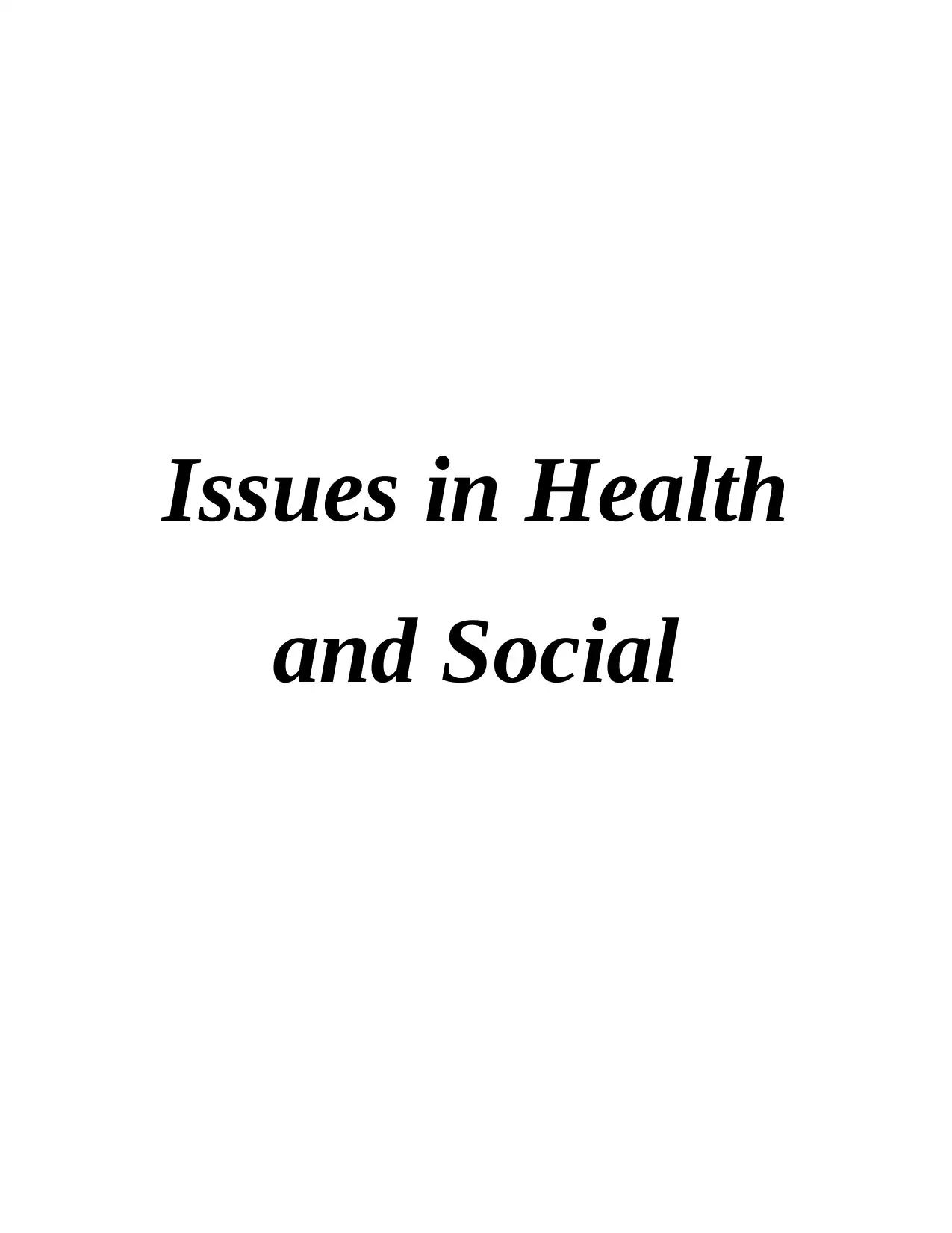
Issues in Health
and Social
and Social
Paraphrase This Document
Need a fresh take? Get an instant paraphrase of this document with our AI Paraphraser
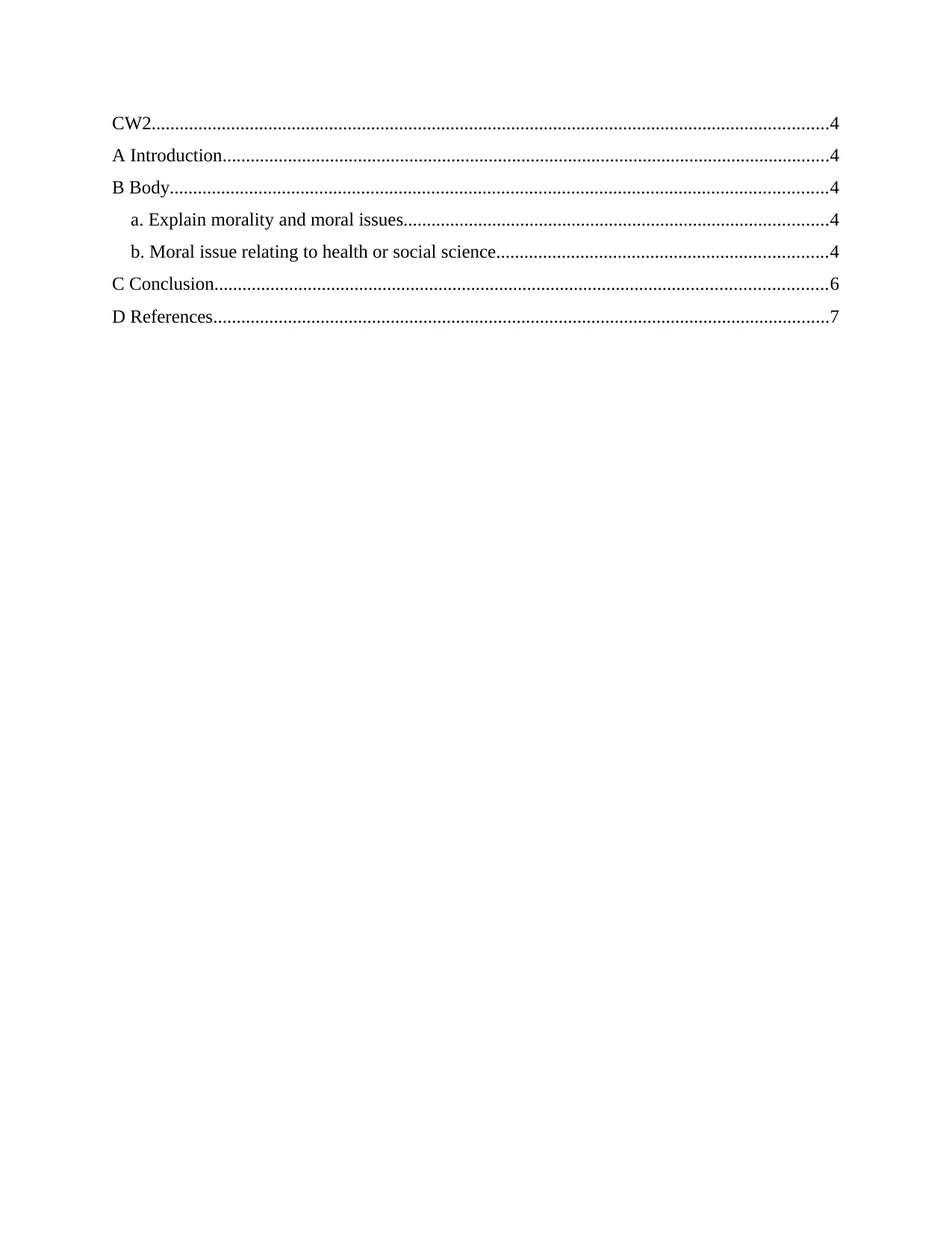
CW2.................................................................................................................................................4
A Introduction..................................................................................................................................4
B Body.............................................................................................................................................4
a. Explain morality and moral issues...........................................................................................4
b. Moral issue relating to health or social science.......................................................................4
C Conclusion...................................................................................................................................6
D References....................................................................................................................................7
A Introduction..................................................................................................................................4
B Body.............................................................................................................................................4
a. Explain morality and moral issues...........................................................................................4
b. Moral issue relating to health or social science.......................................................................4
C Conclusion...................................................................................................................................6
D References....................................................................................................................................7

⊘ This is a preview!⊘
Do you want full access?
Subscribe today to unlock all pages.

Trusted by 1+ million students worldwide
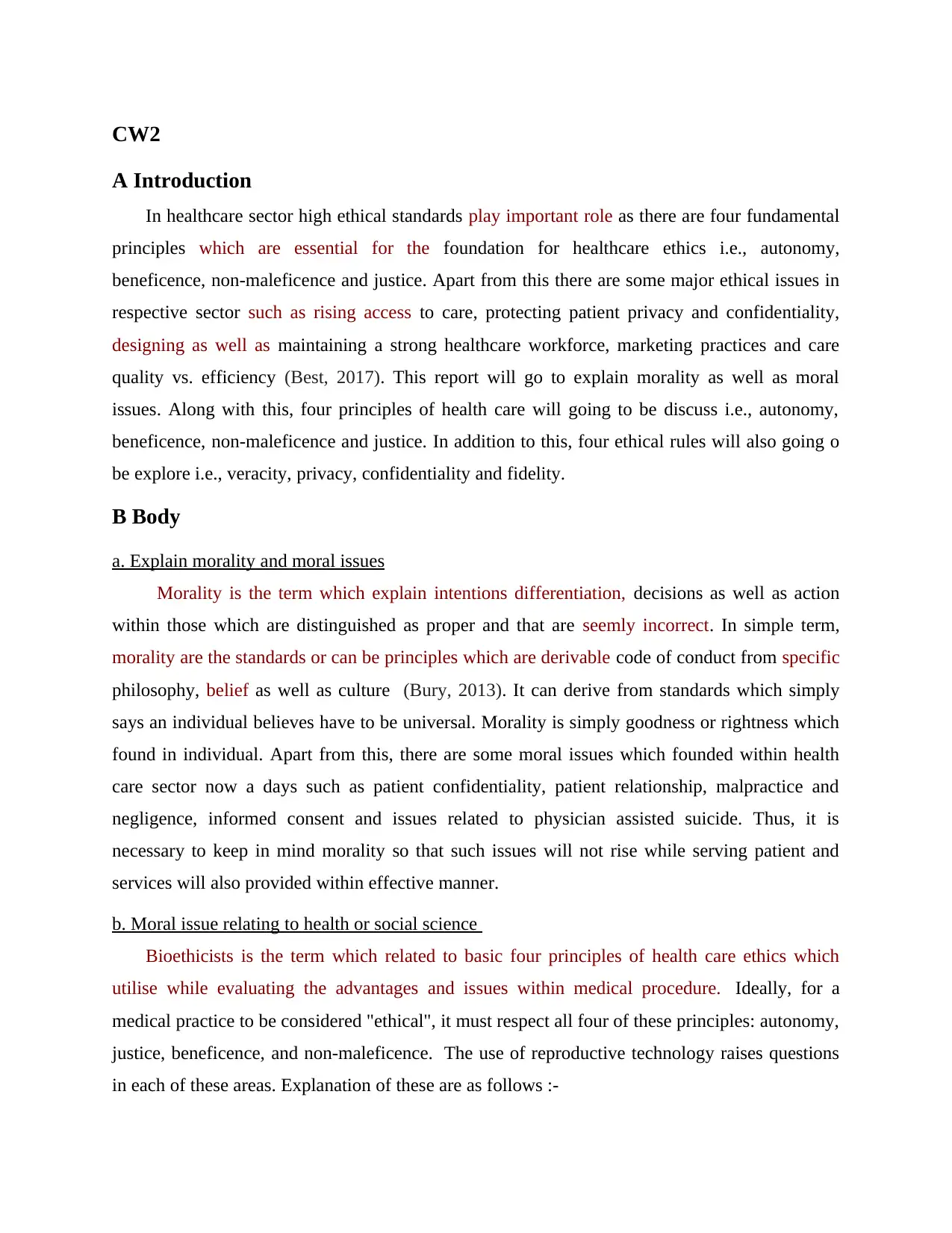
CW2
A Introduction
In healthcare sector high ethical standards play important role as there are four fundamental
principles which are essential for the foundation for healthcare ethics i.e., autonomy,
beneficence, non-maleficence and justice. Apart from this there are some major ethical issues in
respective sector such as rising access to care, protecting patient privacy and confidentiality,
designing as well as maintaining a strong healthcare workforce, marketing practices and care
quality vs. efficiency (Best, 2017). This report will go to explain morality as well as moral
issues. Along with this, four principles of health care will going to be discuss i.e., autonomy,
beneficence, non-maleficence and justice. In addition to this, four ethical rules will also going o
be explore i.e., veracity, privacy, confidentiality and fidelity.
B Body
a. Explain morality and moral issues
Morality is the term which explain intentions differentiation, decisions as well as action
within those which are distinguished as proper and that are seemly incorrect. In simple term,
morality are the standards or can be principles which are derivable code of conduct from specific
philosophy, belief as well as culture (Bury, 2013). It can derive from standards which simply
says an individual believes have to be universal. Morality is simply goodness or rightness which
found in individual. Apart from this, there are some moral issues which founded within health
care sector now a days such as patient confidentiality, patient relationship, malpractice and
negligence, informed consent and issues related to physician assisted suicide. Thus, it is
necessary to keep in mind morality so that such issues will not rise while serving patient and
services will also provided within effective manner.
b. Moral issue relating to health or social science
Bioethicists is the term which related to basic four principles of health care ethics which
utilise while evaluating the advantages and issues within medical procedure. Ideally, for a
medical practice to be considered "ethical", it must respect all four of these principles: autonomy,
justice, beneficence, and non-maleficence. The use of reproductive technology raises questions
in each of these areas. Explanation of these are as follows :-
A Introduction
In healthcare sector high ethical standards play important role as there are four fundamental
principles which are essential for the foundation for healthcare ethics i.e., autonomy,
beneficence, non-maleficence and justice. Apart from this there are some major ethical issues in
respective sector such as rising access to care, protecting patient privacy and confidentiality,
designing as well as maintaining a strong healthcare workforce, marketing practices and care
quality vs. efficiency (Best, 2017). This report will go to explain morality as well as moral
issues. Along with this, four principles of health care will going to be discuss i.e., autonomy,
beneficence, non-maleficence and justice. In addition to this, four ethical rules will also going o
be explore i.e., veracity, privacy, confidentiality and fidelity.
B Body
a. Explain morality and moral issues
Morality is the term which explain intentions differentiation, decisions as well as action
within those which are distinguished as proper and that are seemly incorrect. In simple term,
morality are the standards or can be principles which are derivable code of conduct from specific
philosophy, belief as well as culture (Bury, 2013). It can derive from standards which simply
says an individual believes have to be universal. Morality is simply goodness or rightness which
found in individual. Apart from this, there are some moral issues which founded within health
care sector now a days such as patient confidentiality, patient relationship, malpractice and
negligence, informed consent and issues related to physician assisted suicide. Thus, it is
necessary to keep in mind morality so that such issues will not rise while serving patient and
services will also provided within effective manner.
b. Moral issue relating to health or social science
Bioethicists is the term which related to basic four principles of health care ethics which
utilise while evaluating the advantages and issues within medical procedure. Ideally, for a
medical practice to be considered "ethical", it must respect all four of these principles: autonomy,
justice, beneficence, and non-maleficence. The use of reproductive technology raises questions
in each of these areas. Explanation of these are as follows :-
Paraphrase This Document
Need a fresh take? Get an instant paraphrase of this document with our AI Paraphraser
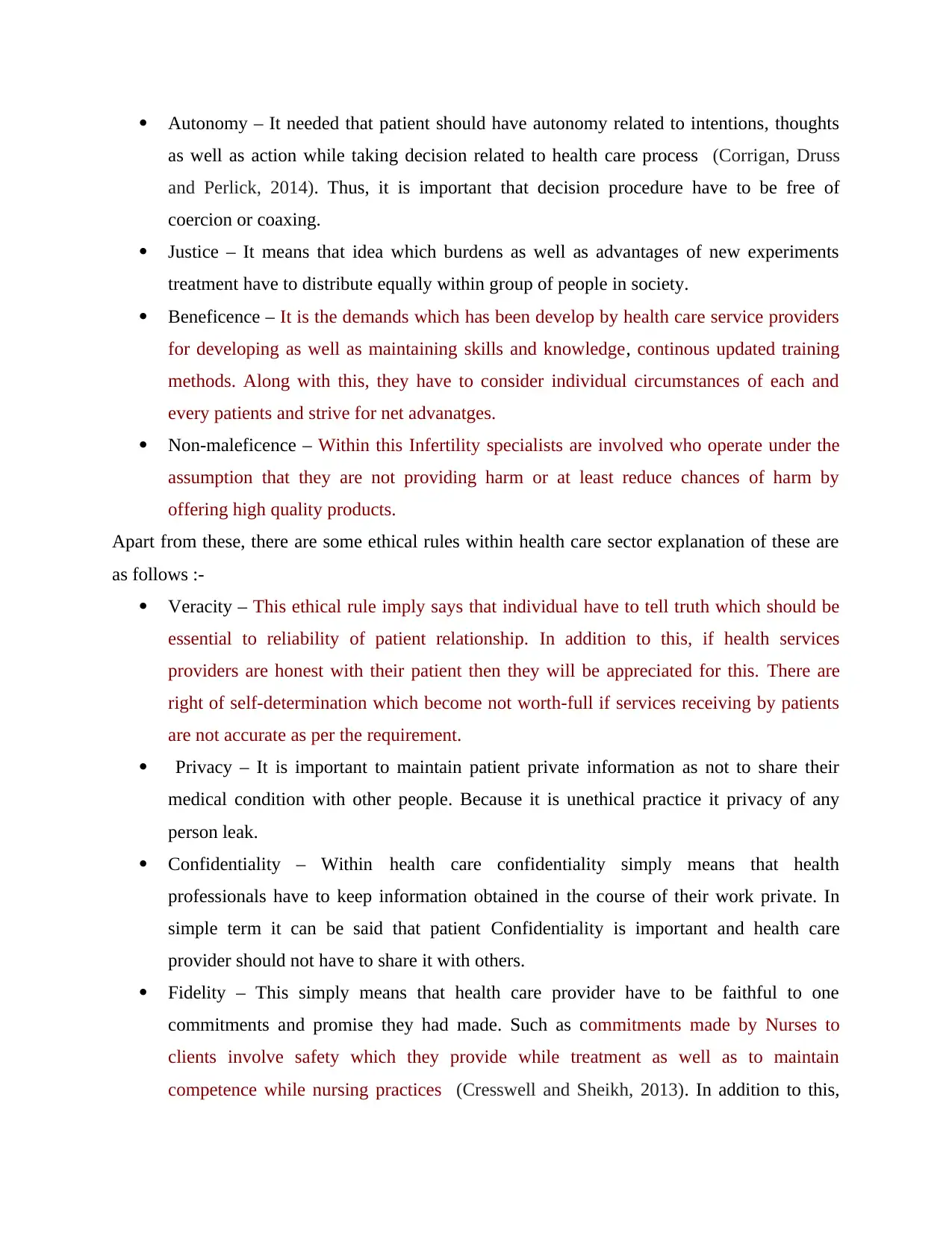
Autonomy – It needed that patient should have autonomy related to intentions, thoughts
as well as action while taking decision related to health care process (Corrigan, Druss
and Perlick, 2014). Thus, it is important that decision procedure have to be free of
coercion or coaxing.
Justice – It means that idea which burdens as well as advantages of new experiments
treatment have to distribute equally within group of people in society.
Beneficence – It is the demands which has been develop by health care service providers
for developing as well as maintaining skills and knowledge, continous updated training
methods. Along with this, they have to consider individual circumstances of each and
every patients and strive for net advanatges.
Non-maleficence – Within this Infertility specialists are involved who operate under the
assumption that they are not providing harm or at least reduce chances of harm by
offering high quality products.
Apart from these, there are some ethical rules within health care sector explanation of these are
as follows :-
Veracity – This ethical rule imply says that individual have to tell truth which should be
essential to reliability of patient relationship. In addition to this, if health services
providers are honest with their patient then they will be appreciated for this. There are
right of self-determination which become not worth-full if services receiving by patients
are not accurate as per the requirement.
Privacy – It is important to maintain patient private information as not to share their
medical condition with other people. Because it is unethical practice it privacy of any
person leak.
Confidentiality – Within health care confidentiality simply means that health
professionals have to keep information obtained in the course of their work private. In
simple term it can be said that patient Confidentiality is important and health care
provider should not have to share it with others.
Fidelity – This simply means that health care provider have to be faithful to one
commitments and promise they had made. Such as commitments made by Nurses to
clients involve safety which they provide while treatment as well as to maintain
competence while nursing practices (Cresswell and Sheikh, 2013). In addition to this,
as well as action while taking decision related to health care process (Corrigan, Druss
and Perlick, 2014). Thus, it is important that decision procedure have to be free of
coercion or coaxing.
Justice – It means that idea which burdens as well as advantages of new experiments
treatment have to distribute equally within group of people in society.
Beneficence – It is the demands which has been develop by health care service providers
for developing as well as maintaining skills and knowledge, continous updated training
methods. Along with this, they have to consider individual circumstances of each and
every patients and strive for net advanatges.
Non-maleficence – Within this Infertility specialists are involved who operate under the
assumption that they are not providing harm or at least reduce chances of harm by
offering high quality products.
Apart from these, there are some ethical rules within health care sector explanation of these are
as follows :-
Veracity – This ethical rule imply says that individual have to tell truth which should be
essential to reliability of patient relationship. In addition to this, if health services
providers are honest with their patient then they will be appreciated for this. There are
right of self-determination which become not worth-full if services receiving by patients
are not accurate as per the requirement.
Privacy – It is important to maintain patient private information as not to share their
medical condition with other people. Because it is unethical practice it privacy of any
person leak.
Confidentiality – Within health care confidentiality simply means that health
professionals have to keep information obtained in the course of their work private. In
simple term it can be said that patient Confidentiality is important and health care
provider should not have to share it with others.
Fidelity – This simply means that health care provider have to be faithful to one
commitments and promise they had made. Such as commitments made by Nurses to
clients involve safety which they provide while treatment as well as to maintain
competence while nursing practices (Cresswell and Sheikh, 2013). In addition to this,
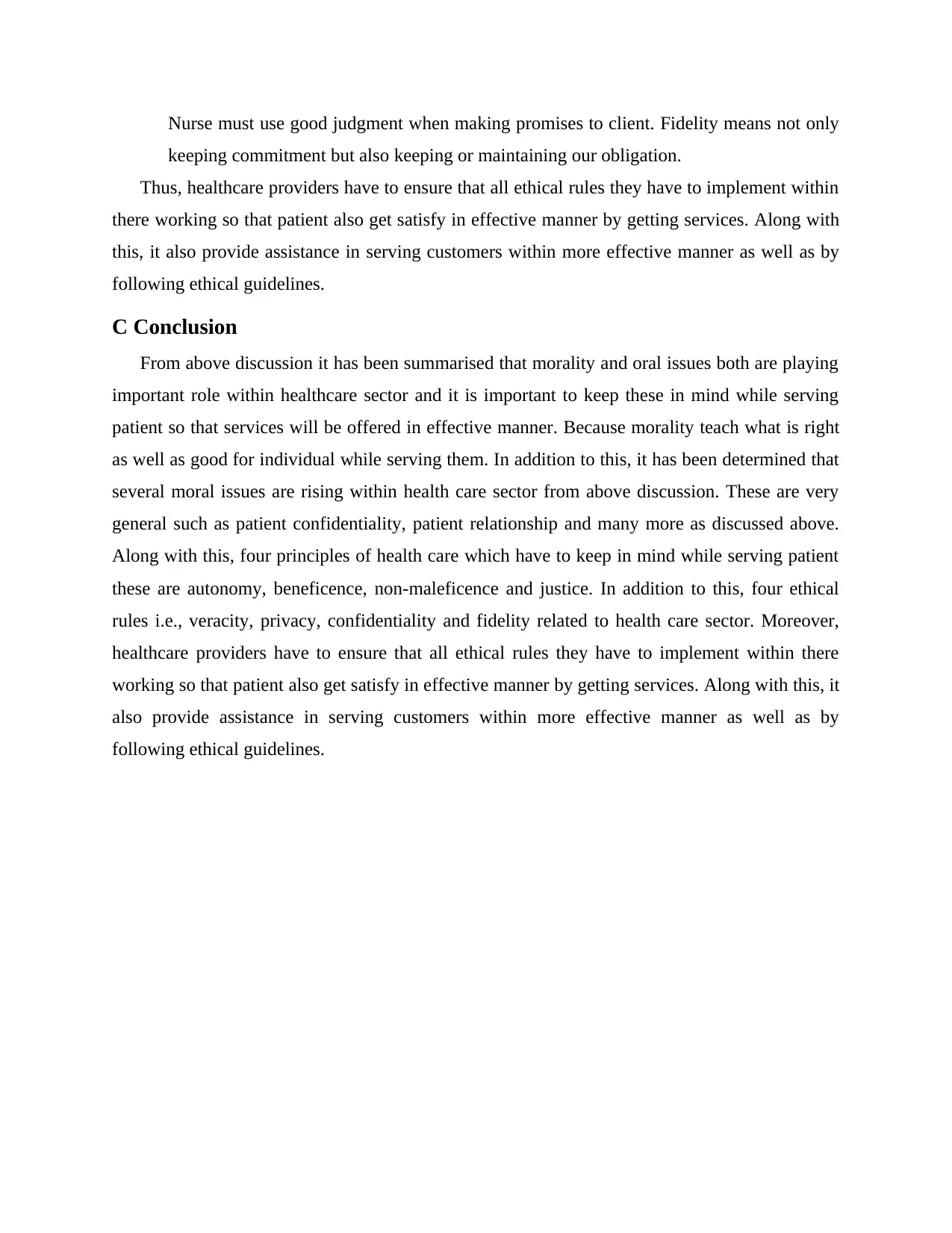
Nurse must use good judgment when making promises to client. Fidelity means not only
keeping commitment but also keeping or maintaining our obligation.
Thus, healthcare providers have to ensure that all ethical rules they have to implement within
there working so that patient also get satisfy in effective manner by getting services. Along with
this, it also provide assistance in serving customers within more effective manner as well as by
following ethical guidelines.
C Conclusion
From above discussion it has been summarised that morality and oral issues both are playing
important role within healthcare sector and it is important to keep these in mind while serving
patient so that services will be offered in effective manner. Because morality teach what is right
as well as good for individual while serving them. In addition to this, it has been determined that
several moral issues are rising within health care sector from above discussion. These are very
general such as patient confidentiality, patient relationship and many more as discussed above.
Along with this, four principles of health care which have to keep in mind while serving patient
these are autonomy, beneficence, non-maleficence and justice. In addition to this, four ethical
rules i.e., veracity, privacy, confidentiality and fidelity related to health care sector. Moreover,
healthcare providers have to ensure that all ethical rules they have to implement within there
working so that patient also get satisfy in effective manner by getting services. Along with this, it
also provide assistance in serving customers within more effective manner as well as by
following ethical guidelines.
keeping commitment but also keeping or maintaining our obligation.
Thus, healthcare providers have to ensure that all ethical rules they have to implement within
there working so that patient also get satisfy in effective manner by getting services. Along with
this, it also provide assistance in serving customers within more effective manner as well as by
following ethical guidelines.
C Conclusion
From above discussion it has been summarised that morality and oral issues both are playing
important role within healthcare sector and it is important to keep these in mind while serving
patient so that services will be offered in effective manner. Because morality teach what is right
as well as good for individual while serving them. In addition to this, it has been determined that
several moral issues are rising within health care sector from above discussion. These are very
general such as patient confidentiality, patient relationship and many more as discussed above.
Along with this, four principles of health care which have to keep in mind while serving patient
these are autonomy, beneficence, non-maleficence and justice. In addition to this, four ethical
rules i.e., veracity, privacy, confidentiality and fidelity related to health care sector. Moreover,
healthcare providers have to ensure that all ethical rules they have to implement within there
working so that patient also get satisfy in effective manner by getting services. Along with this, it
also provide assistance in serving customers within more effective manner as well as by
following ethical guidelines.
⊘ This is a preview!⊘
Do you want full access?
Subscribe today to unlock all pages.

Trusted by 1+ million students worldwide
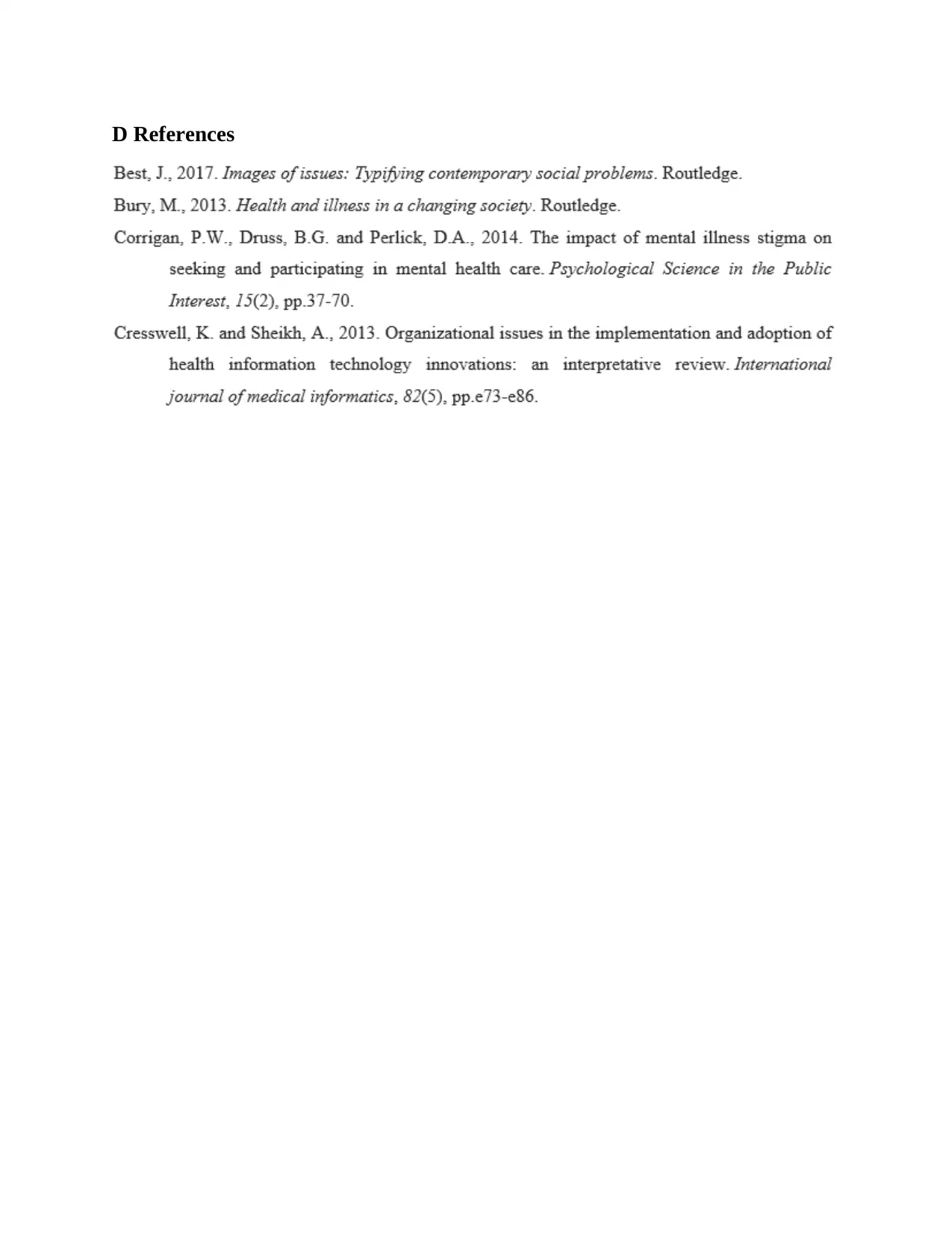
D References
1 out of 7
Related Documents
Your All-in-One AI-Powered Toolkit for Academic Success.
+13062052269
info@desklib.com
Available 24*7 on WhatsApp / Email
![[object Object]](/_next/static/media/star-bottom.7253800d.svg)
Unlock your academic potential
Copyright © 2020–2026 A2Z Services. All Rights Reserved. Developed and managed by ZUCOL.





